小说的文学术语
文学批评术语词典
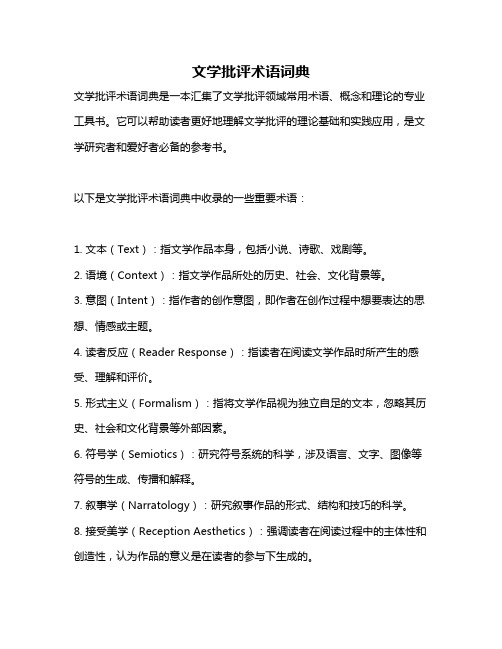
文学批评术语词典
文学批评术语词典是一本汇集了文学批评领域常用术语、概念和理论的专业工具书。
它可以帮助读者更好地理解文学批评的理论基础和实践应用,是文学研究者和爱好者必备的参考书。
以下是文学批评术语词典中收录的一些重要术语:
1. 文本(Text):指文学作品本身,包括小说、诗歌、戏剧等。
2. 语境(Context):指文学作品所处的历史、社会、文化背景等。
3. 意图(Intent):指作者的创作意图,即作者在创作过程中想要表达的思想、情感或主题。
4. 读者反应(Reader Response):指读者在阅读文学作品时所产生的感受、理解和评价。
5. 形式主义(Formalism):指将文学作品视为独立自足的文本,忽略其历史、社会和文化背景等外部因素。
6. 符号学(Semiotics):研究符号系统的科学,涉及语言、文字、图像等符号的生成、传播和解释。
7. 叙事学(Narratology):研究叙事作品的形式、结构和技巧的科学。
8. 接受美学(Reception Aesthetics):强调读者在阅读过程中的主体性和创造性,认为作品的意义是在读者的参与下生成的。
9. 结构主义(Structuralism):将文学作品视为一个整体,研究其内在的结构、关系和规律。
10. 后结构主义(Poststructuralism):对结构主义的批判和超越,强调个体主体性和文本的开放性。
这只是一小部分文学批评术语的示例,实际上,文学批评领域的术语极为丰富多样。
文学批评术语词典将会对深入理解文学批评的概念和理论提供极大的帮助。
文学术语

文学术语Terms in English Literature1.Allegory (寓言)A tale in verse or prose in which characters, actions, or settings represent abstract ideas or moral qualities.寓言,讽喻:一种文学、戏剧或绘画的艺术手法,其中人物和事件代表抽象的观点、原则或支配力。
2.Alliteration (头韵)Alliteration is the repetition of the same initial consonant sound within a line or a group of words.头韵:在一组词的开头或重读音节中对相同辅音或不同元音的重复。
3.Allusion (典故)A reference to a person, a place, an event, or a literary work that a writer expects the reader to recognize and respond to.典故:作者对某些读者熟悉并能够做出反映的特定人物,地点,事件,文学作品的引用。
4.Analogy (类比)A comparison made between two things to show the similarities between them.类比:为了在两个事物之间找出差别而进行的比较。
5. Antagonist (反面主角)The principal character in opposition to the protagonist or hero or heroineof a narrative or drama.反面主角:叙事文学或戏剧中与男女主人公或英雄相对立的主要人物。
6. Antithesis (对仗)The balancing of two contrasting ideas, words, or sentences.对仗:两组相对的思想,言辞,词句的平衡。
非主流文学名词解释

非主流文学名词解释
非主流文学是一种独立于主流文学传统的文学流派,其作品多为较为个性化、反传统、表达个体情感与思想的文学作品。
以下是一些非主流文学常见术语的解释:
1. 微型小说:一种以短小精悍的篇幅表达情感、思想、故事的文学形式。
2. 诗意散文:结合诗歌意象和散文叙事方式的文学体裁,常常表达个人的心情与思考。
3. 情绪散文:以真实的情感为根据,通过写作表达自己的情绪、心情和体验的一种散文形式。
4. 反传统诗歌:以批判传统为主要目标的诗歌,常常采用自由诗、抒情诗等形式。
5. 异质小说:通过对异象、幻想等元素的运用,创造出具有独特风格的小说。
6. 程序小说:采用多重叙述视角和不同的叙述方式,把小说作品看成一种程序,从而创造出一种多层次的叙事结构。
7. 自传体小说:以作者自己的经历和体验为基础,通过小说的方式加以创作的一种小说形式。
这些非主流文学术语的出现,丰富了文学的多样性,也反映了人们对于文学形式与内容的不断探索和创新。
- 1 -。
外国文学名词解释
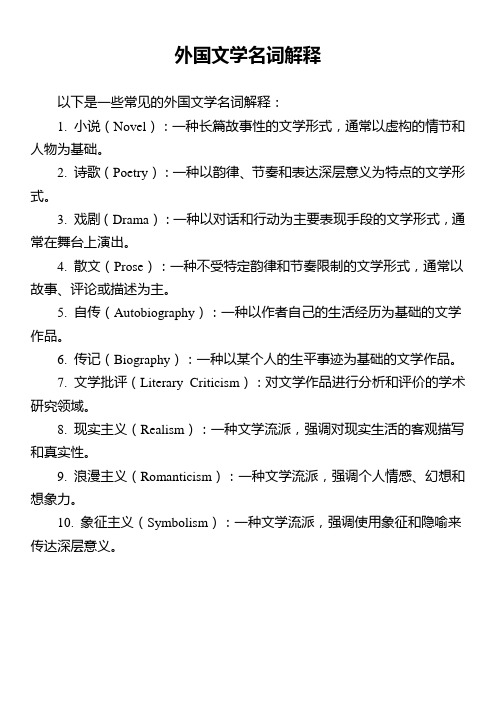
外国文学名词解释
以下是一些常见的外国文学名词解释:
1. 小说(Novel):一种长篇故事性的文学形式,通常以虚构的情节和人物为基础。
2. 诗歌(Poetry):一种以韵律、节奏和表达深层意义为特点的文学形式。
3. 戏剧(Drama):一种以对话和行动为主要表现手段的文学形式,通常在舞台上演出。
4. 散文(Prose):一种不受特定韵律和节奏限制的文学形式,通常以故事、评论或描述为主。
5. 自传(Autobiography):一种以作者自己的生活经历为基础的文学作品。
6. 传记(Biography):一种以某个人的生平事迹为基础的文学作品。
7. 文学批评(Literary Criticism):对文学作品进行分析和评价的学术研究领域。
8. 现实主义(Realism):一种文学流派,强调对现实生活的客观描写和真实性。
9. 浪漫主义(Romanticism):一种文学流派,强调个人情感、幻想和想象力。
10. 象征主义(Symbolism):一种文学流派,强调使用象征和隐喻来传达深层意义。
小说术语

文学作品阅读之小说文学作品阅读体裁的特征决定考查的目标,小说有三要素:人物,故事情节,环境。
以上三要素为写作内容,写作目的是表现主题。
根据高考文学作品阅读的中心(写作内容和写作目的)命题的原则,必然是围绕以上四点出题的,也就决定了我们在阅读小说体裁的时候,也要知道自己要读出什么。
读出什么?读出小说的四大点:人物形象故事情节环境描写(自然环境和社会环境)!第一节把握故事情节情节对应一般阅读文本的结构。
所以概括情节时,要注意一般结构文本的要素:标题、开头、结尾、段落、层次、照应、线索、过渡、铺垫。
情节有四大考点:情节的概括、情节的技巧(包括开头和结尾的技巧)、情节的作用情节的概括考查形式有①请概括故事情节。
一般答题要点为四个点:开端、发展、高潮、结局。
有时要先概括线索。
②用一句话或简明的语句概括故事情节。
一般概括形式为---主+谓(或+宾);③文中共写了哪几件事,请依次加以概括;④概括小说的部分内容(包括指出开端、发展、高潮、结局四部分中的某一方面)。
概括小说故事情节要从理清小说的结构层次、寻找线索、抓住重要场面、重要事件等几方面概括文章的主要情节。
例如2009年高考四川卷小说阅读《想象》第15题:这篇小说的故事情节是怎样展开的?请概括回答。
参考答案:以“想象”为线索,以心理活动描写为主要方式来展开故事情节……情节的技巧小说是情节的艺术。
情节的设置技巧一般有:悬念(如倒叙),巧合,误会,抑扬,意外(突转)等。
小说常见开头:①设疑法。
作用有:引起读者的阅读兴趣或思考,制造悬念,吸引读者;引出下文的情节;突出人物形象;揭示小说主题。
②写景法。
作用就是渲染气氛,烘托情感,烘托人物形象,点明故事发生的时间、地点、社会时代背景等,如果是自然环境描写,还可以暗示当时的社会坏境的作用;暗示或推动情节的发展;表现主题等。
小说常见的结尾:①出人意料的结局,又在情理之中。
从结构安排上看,它使平淡的故事情节陡然生出波澜,猛烈撞击读者的心灵,产生震撼人生的力量;从表现手法上看,与前文的伏笔相照应,使人觉得又在情理之中。
文学类文本(小说)

文学类文本(小说)人物形象情节语言分类人物事物主要人物次要人物群像人物陪衬性事物线索性事物描写手法正面描写侧面描写外貌(肖像)描写、语言描写、动作描写、神态描写、心理描写(“外语动神心”)细节描写分析方法把握小说交代的人物身份、地位、经历、教养等语句(叙述)分析人物的外貌、动作、语言、心理等语句(描写)依据人物间的关系、作者的评价、其他人物的评价(叙述和议论)联系人物所处的环境故事情节和矛盾冲突的角度主题作用、社会意义、作者意图、读者效果线索作用、侧面衬托、群体背景、烘托主题物象作用线索作用、显示环境、烘托人物、深化主题结构叙述人称叙述手法顺叙线索表达技巧基本模式特殊模式开端、发展、高潮、结局摇摆式欧亨利式开端写景开头设悬开头故事开头交代环境、背景渲染气氛,酝酿情感暗示主题,暗示人物命运引起读者阅读兴趣引出下文,为下文埋伏笔映衬主要故事结尾写景结尾大团圆结尾欧亨利式结尾在高潮处结尾悲剧式结尾第一人称第二人称第三人称插叙倒叙单线、双线(明暗线、主次线)双主线环境描写描写技巧1)白描与细描;2)动静结合,虚实结合,正侧结合,点面结合等;3)比喻、拟人、夸张、排比等修辞手法描写角度1)感觉角度:视觉、听觉、嗅觉、味觉、触觉等; 2)观察角度:定点观察、移步换景等; 3)写景顺序:远近结合、高低结合、内外结合等描写作用自身作用表现地域特色和时令特征等,突出环境特点,营造意境交代时间、地点,暗示社会环境渲染某种气氛,奠定情感基调,感染读者或激发读者的阅读兴趣情节作用暗示或推动情节发展为后面情节的发展做铺垫或制造悬念有时作为情节发展的线索,使文脉更清晰或有起伏波折相互照应(照应标题、开头或结尾等)使文脉更加紧凑完整。
人物作用交代人物活动及其成长的时代背景,揭示各种复杂的社会关系交代人物身份,表现人物性格主题作用烘托象征,寄托情感,深化主题句子含义句子作用语言特点词语锤炼句式选择手法运用整体风格叠音词、拟声词、动词、形容词、副词等长短句的交错运用,整句与散句的运用效果,书面语与口语的特殊作用,民谣、戏词等歌曲的作用修辞格的作用;表达方式的作用平实、清新、华丽、幽默、自然、简洁明快、含蓄深沉、寓庄于谐、口语化、生动形象、有地方色彩内容作用结构作用揭示文章主旨,表明文章中心;点题统领全文,引出下文;为下文做铺垫,埋伏笔;巧设悬念,引人入胜;承上启下,过渡衔接;对比衬托,铺陈渲染;照应全文,首尾呼应句子表面意思从句子表面意思出发,联系语言环境,分析句内意思和句外意思。
文学中的double 术语-概述说明以及解释
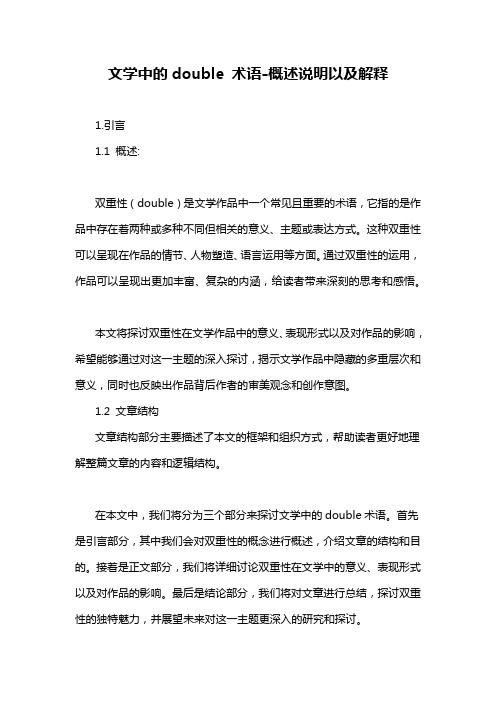
文学中的double 术语-概述说明以及解释1.引言1.1 概述:双重性(double)是文学作品中一个常见且重要的术语,它指的是作品中存在着两种或多种不同但相关的意义、主题或表达方式。
这种双重性可以呈现在作品的情节、人物塑造、语言运用等方面。
通过双重性的运用,作品可以呈现出更加丰富、复杂的内涵,给读者带来深刻的思考和感悟。
本文将探讨双重性在文学作品中的意义、表现形式以及对作品的影响,希望能够通过对这一主题的深入探讨,揭示文学作品中隐藏的多重层次和意义,同时也反映出作品背后作者的审美观念和创作意图。
1.2 文章结构文章结构部分主要描述了本文的框架和组织方式,帮助读者更好地理解整篇文章的内容和逻辑结构。
在本文中,我们将分为三个部分来探讨文学中的double术语。
首先是引言部分,其中我们会对双重性的概念进行概述,介绍文章的结构和目的。
接着是正文部分,我们将详细讨论双重性在文学中的意义、表现形式以及对作品的影响。
最后是结论部分,我们将对文章进行总结,探讨双重性的独特魅力,并展望未来对这一主题更深入的研究和探讨。
通过这样的结构安排,读者可以清晰地了解本文所要探讨的主题内容,并帮助他们更好地理解和把握文章的主要论点和观点。
1.3 目的:本文旨在探讨文学作品中常见的double术语,并分析其在文学中的重要性和影响。
通过对双重性在文学领域的概念和表现形式进行深入探讨,我们可以更好地理解文学作品背后的意义和内涵。
此外,本文还将探讨双重性对作品的影响,以及其在文学创作中的应用。
通过对双重性的研究,我们可以更深入地了解文学作品的多重意义和魅力,进一步拓展我们对文学的认识和理解。
希望通过本文的分析和探讨,读者能够对文学作品中的双重性有更深入的认识,从而更好地欣赏和理解文学作品的价值和内涵。
2.正文2.1 双重性在文学中的意义双重性在文学中的意义是指文学作品中存在着多重意义、多重解读的现象。
这种双重性不仅仅是文学作品本身的内在特征,更是文学作品与读者之间的互动。
文学评论常用的术语

文学评论常用的术语
1. “主题”,就像一部作品的灵魂啊!比如,它那奇幻又深刻的主题,不正是让我们沉浸其中的原因吗?
2. “人物形象”,这可是作品的血肉呀!像孙悟空,那鲜明独特的形象,谁能不记得呢?
3. “情节”,这不就是故事的脊梁嘛!里那跌宕起伏的情节,多吸引人啊!
4. “语言风格”,这简直是作品的外衣呀!张爱玲那细腻华丽的语言风格,多有魅力啊!
5. “意象”,如同作品中的闪光点!古诗中那些美妙的意象,不就是让我们陶醉的所在吗?
6. “象征”,那可是蕴含深意的密码呀!中的红高粱不就象征着生命力吗?
7. “叙事视角”,这是观察故事的眼睛呢!用独特的视角,让我们看到了不一样的世界。
8. “结构”,就像是建筑的框架呀!一部好作品的结构肯定是精巧的,不是吗?
9. “氛围”,是作品的独特气场呀!恐怖小说营造的那种紧张氛围,真让人毛骨悚然!
10. “寓意”,这可是作品的深层内涵呢!里的寓意,多给人启发啊!
我觉得这些文学评论常用术语就像一把把钥匙,能帮我们更好地打开文学作品的大门,深入领略其中的美妙。
文学名词解释

文学名词解释文学名词是用来描述文学作品、文学现象或文学理论的专门术语。
以下是一些常见的文学名词的解释:1. 小说:一种长篇故事性的文学作品,通常包含人物、情节和背景设置。
2. 诗歌:一种利用韵脚、节奏和意象等修辞手法表达思想和情感的文学形式。
3. 戏剧:一种通过角色的对话和行动来表达情节、观点和主题的文学作品,也可以指演出的艺术形式。
4. 散文:一种不使用诗歌形式的散文作品,以叙事、描写和议论为特点。
5. 史诗:一种叙述英雄传奇或重大历史事件的叙事诗歌形式。
6. 寓言:一种通过虚构的故事来传递道德或寓意的文学形式,常常包含人物化的动物或物体。
7. 韵文:一种使用韵脚的诗歌形式。
8. 抒情诗:一种表达作者个人情感和体验的诗歌形式。
9. 叙事诗:一种通过叙述来讲述故事或事件的诗歌形式。
10. 渲染:一种通过描写细节和氛围来表达情感或场景的文学技巧。
11. 刻画:一种通过描写人物的外貌、个性、思想和情感来使其栩栩如生的文学技巧。
12. 比喻:一种通过将一个事物与另一个事物进行类比来传递意义的修辞手法。
13. 暗示:一种通过暗示或间接暗示来传递意义或创造悬念的修辞手法。
14. 反讽:一种通过用词或语气的反差来传递愤怒、嘲笑或讽刺的修辞手法。
15. 典型:一种具有普遍性和代表性的文学人物、情节或主题。
16. 悬念:一种通过悬而未决的情节发展来引发读者的紧张感和好奇心的文学技巧。
17. 主题:一种作品中表达的基本思想、观点或价值观。
18. 道德:一种在作品中传递的道德准则或价值观。
19. 简洁:一种通过言简意赅地表达思想和情感的文学风格。
20. 风格:作家独特的写作方式,包括词语选择、句法结构和修辞手法等。
这些文学名词的解释可以帮助读者更好地理解和欣赏文学作品,同时也可以用于文学研究和批评中。
文学英语词汇大全了解经典文学作品的专业术语
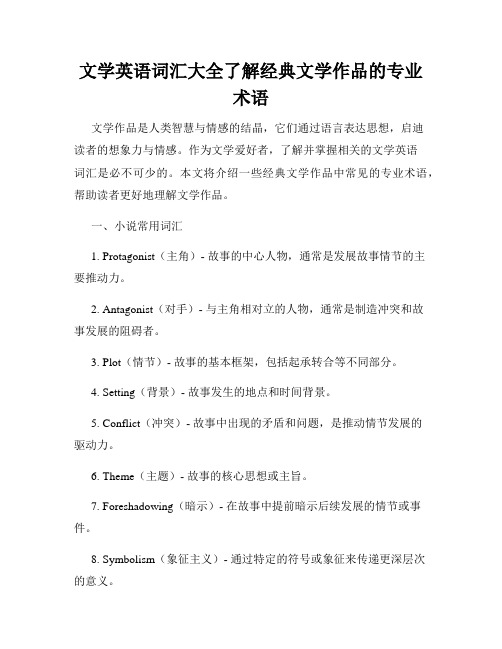
文学英语词汇大全了解经典文学作品的专业术语文学作品是人类智慧与情感的结晶,它们通过语言表达思想,启迪读者的想象力与情感。
作为文学爱好者,了解并掌握相关的文学英语词汇是必不可少的。
本文将介绍一些经典文学作品中常见的专业术语,帮助读者更好地理解文学作品。
一、小说常用词汇1. Protagonist(主角)- 故事的中心人物,通常是发展故事情节的主要推动力。
2. Antagonist(对手)- 与主角相对立的人物,通常是制造冲突和故事发展的阻碍者。
3. Plot(情节)- 故事的基本框架,包括起承转合等不同部分。
4. Setting(背景)- 故事发生的地点和时间背景。
5. Conflict(冲突)- 故事中出现的矛盾和问题,是推动情节发展的驱动力。
6. Theme(主题)- 故事的核心思想或主旨。
7. Foreshadowing(暗示)- 在故事中提前暗示后续发展的情节或事件。
8. Symbolism(象征主义)- 通过特定的符号或象征来传递更深层次的意义。
9. Irony(讽刺)- 用逆转的手法展示出与表面相反的结果或意义。
10. Point of view(视角)- 故事叙述的角度,可以是第一人称、第三人称等。
二、诗歌专业术语1. Rhyme(押韵)- 诗歌中相邻句子或词语的音韵相同或相似。
2. Meter(韵律)- 诗歌中由重音和轻音组成的节奏。
3. Stanza(诗节)- 诗歌中的一组排列整齐的行。
4. Simile(明喻)- 通过使用"like"或"as"来进行比喻的修辞手法。
5. Metaphor(隐喻)- 直接将一个事物比作另一个事物的修辞手法。
6. Personification(拟人)- 赋予非人事物以人类特征的修辞手法。
7. Alliteration(头韵)- 诗句中多个字母或音节以相同的辅音开头。
8. Assonance(押韵)- 诗句中多个字母或音节以相同的元音结尾。
文学英语单词

文学英语单词当我们谈论文学时,我们通常会用到许多专业术语。
以下是一些与文学相关的常用英语单词和短语。
1. prose (散文)Prose是一种不用诗歌的形式写作的文学,通常采用直接的语言和故事情节。
许多小说,短篇小说以及戏剧都属于散文体裁。
2. poetry (诗歌)诗歌是一种用特殊的形式、韵律和语言写成的文学作品。
它的目的是通过美丽的措辞和创造性的形象来表达情感和思想。
3. fiction (小说)小说是一种虚构的故事,通常以一个或多个主角为中心。
它可以是现实主义,超现实主义,科幻或神话。
4. non-fiction (非小说)非小说是指不虚构的写作,例如传记,历史和科学文献。
5. genre (文学流派)文学流派是指文学作品根据特定的主题或元素所分类的方法。
一些流派包括浪漫主义,现代主义和古典主义。
6. symbolism (象征主义)象征主义是指一种文学或艺术运动,通过使用象征或隐喻来表达主题或情感。
7. metaphor (隐喻)隐喻是一种文学技巧,在其中一个事物与另一个不相关的事物做比较,来描述一种情感或思想。
8. imagery (意象)意象是指文学作品中用来表达思想和情感的生动形象的集合。
它可以由形容词,名词,动词和比喻组成。
9. irony (反语)反语是通过使用表达相反意思的言辞来表达一种情感或观点的技巧。
10. alliteration (头韵)头韵是一种文学技巧,在其中一个句子中的一些单词使用相同的第一个辅音音素。
11. allegory (寓言)寓言是一种文学技巧,其中故事中的人物,情节和情感都代表着一些更大的哲学或宗教观点。
12. satire (讽刺)讽刺是一种文学技巧,通过使用幽默和夸张来揭示某些问题的错误和问题,以激发改变。
当我们谈论文学时,这些英语单词和短语是必不可少的,它们的使用可以帮助读者更好地理解和欣赏文学作品。
文学理论术语小辞典
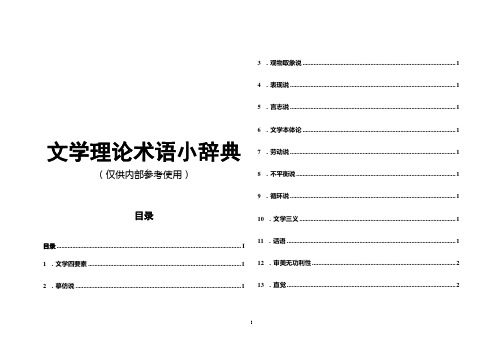
文学理论术语小辞典(仅供内部参考使用)目录目录 (I)1 .文学四要素 (1)2 .摹仿说 (1)3 .观物取象说 (1)4 .表现说 ......................................................................................................... 15 .言志说 (1)6 .文学本体论 (1)7 .劳动说 (1)8 .不平衡说 (1)9 .循环说 (1)10 .文学三义 (1)11 .话语 (1)12 .审美无功利性 (2)13 .直觉 (2)14 .文学的审美意识形态性质 (2)15 .文学的双重性质 (2)16 .话语蕴藉 (2)17 .含蓄与含混 (2)18 .文学 (2)19 .文学创造材料 (2)20 .艺术发现 (2)21 .创作动机 (2)22 .艺术构思 (2)23 .回忆与沉思 (2)24 .想象与联想 (3)25 .灵感与直觉 (3)26 .理智与情感 (3)27 .意识与无意识 (3)28 .综合 (3)29 .突出和简化 (3)30 .变形与陌生化 (3)31 .即兴与推敲 (3)32 .现实型文学 (4)33 .理想型文学 (4)34 .象征型文学 (4)35 .浪漫主义文学 (4)36 .现实主义文学 (4)37 .象征主义文学 (4)38 .现代主义文学 (4)39 .诗 (4)40 .小说 (4)41 .剧本 (4)42 .散文 ........................................................................................................... 543 .报告文学 (5)44 .文学本文三层次 (5)45 .文学话语的特征 (5)46 .文学形象及其特征 (5)47 .文学意蕴及其层次 (5)48 .文学典型 (5)49 .文学意境 (5)50 .情景交融 (5)51 .虚实相生 (5)52 .韵味无穷 (6)53 .审美意象 (6)54 .叙事 (6)55 .叙事的构成 (6)56 .本文时间和故事时间 (6)57 .时序 (6)58 .时长 (6)59 .频率 (6)60 .叙述视角 (6)61 .叙述动作 (6)62 .叙述者 (6)63 .拟想接受者 (6)64 .抒情及其特征 (7)65 .宣泄 (7)66 .抒情内容与抒情话语 (7)67 .声与情 (7)68 .景与情 (7)69 .抒情方式 (7)70 .抒情角色 (8)71 .风格 (8)72 .创作个性 (8)73 .话语情境 (8)74 .文学风格的特性 (8)75 .文学风格的形态 (8)76 .文学消费的二重性 (8)77 .期待视野 (8)78 .接受动机 (8)79 .接受心境 (8)80 .隐含的读者 ............................................................................................... 881 .填空、对话与兴味 .. (8)82 .还原与异变 (9)83 .理解与误解 (9)84 .期待遇挫 (9)85 .共鸣 (9)86 .净化 (9)87 .领悟 (9)88 .延留 (9)1 .文学四要素。
文学常识文学体裁类别

文学常识文学体裁类别导语:文学体裁是文学作品的类别。
它分为散文、小说、戏剧、诗歌四大类。
下面我们来详细看看。
Ⅰ散文散文的重要特点是“形散神不散”。
“形散”主要指取材十分广泛自由,联想丰富,不受时间和空间的限制;“神不散”,主要指表达的主题必须明确而集中。
散文常用的艺术手法有:寓情于景,即景抒情(如朱自清的《荷塘月色》),寓情于事,因事见情(如鲁迅的《为了忘却的纪念》),寓情于物,托物言志(如巴金的《灯》)。
Ⅱ小说小说是以刻画人物形象为中心,通过完整的故事情节和环境描写来反映社会生活的一种文学体裁。
小说的三要素是人物、情节和环境。
小说的情节一般包括开端、发展、高潮、结局等四部分,有的还有序幕和尾声。
环境包括社会环境和自然环境。
社会环境主要交代人物所处的时代背景;自然环境主要交代人物活动的时间、地点、场景,或用以烘托气氛,或表现人物感情,或推动人物情节发展等。
按照不同的标准,小说可分为不同的种类:按篇幅及容量分为长篇、中篇、短篇、微型小说(小小说)。
按内容分为历史小说、现代小说、科学幻想小说、公案小说、武侠小说、言情小说、传奇小说等。
按写作体制分为章回小说、日记体、书信体、自传体等。
按语言形式分为文言小说和白话小说。
我国古代小说发展的几个阶段:⑴寓言(先秦两汉),如《精卫填海》《夸父追日》。
⑵笔记小说(魏晋南北朝),如干宝的《搜神记》(又成志怪、志人小说)。
⑶传奇(唐代),如李朝威的《柳毅传》。
⑷话本(宋代),如《快嘴李翠莲》。
⑸拟话本(明代),如《杜十娘怒沉百宝箱》。
⑹章回小说(明、清),如《红楼梦》。
Ⅲ戏剧戏剧是一种综合的舞台艺术。
这里讲的戏剧实际上就是剧本,它是文学体裁的一种。
戏剧语言包括人物语言(即台词)和舞台说明。
舞台说明是写在剧本每一幕的开端、结尾和对话中间的说明行文字,内容包括人物表、时间、地点、服装、道具、布景及人物的表情、动作、上下场等,它具有增强舞台气氛、烘托人物心情、展示人物性格、推动情节展开等多种作用。
儿童文学名词解释

儿童文学名词解释儿童文学是专门为儿童群体创作的文学作品,具有一定的教育性和娱乐性,是儿童心灵成长的重要组成部分。
在儿童文学中,涵盖了许多特定的名词和术语,这些名词和术语的解释和理解对于儿童文学的学习和阅读有着重要的意义。
本文将介绍一些常见的儿童文学名词,让我们更好地理解和欣赏儿童文学作品。
1. 童话:童话是儿童文学中最重要和最广泛受到欢迎的一种文学体裁。
它通常以故事的形式呈现,以奇幻的情节和人物为主要元素,以儿童为受众对象,传达了一些简单而深刻的道德教育和生活哲理。
2. 童谣:童谣是一种通过押韵和节奏的方式表达的古老文学形式,常常用于儿童的娱乐和学习。
它往往包括简单明了的歌词和旋律,让儿童易于理解和乐于接受。
3. 绘本:绘本是一种结合图像和文字的书籍,适合儿童阅读。
它通常采用大字体和丰富的插图,通过图文并茂的方式,激发儿童对阅读的兴趣,同时培养儿童的想象力和阅读能力。
4. 知识绘本:知识绘本是一种特殊类型的绘本,注重知识普及和启发儿童的认知发展。
它常常涉及科学、社会、历史等各个领域的知识,通过深入浅出的方式,帮助儿童了解和掌握不同方面的知识。
5. 动画片:动画片是一种通过连续播放一幅幅静态图像来制作的影像艺术形式。
它在儿童文学中起着重要的角色,为儿童创造了一个生动有趣的世界,通过动画片,儿童可以更好地理解故事情节和人物形象。
6. 寓言:寓言是一种通过故事的方式传递道德教育的文学形式。
它常常以动物或其他拟人化的形象来描绘不同的角色,通过这些角色之间的互动和经历,教导儿童一些关于生活和道德准则的重要启示。
7. 小说:小说是儿童文学中另一种重要的文学形式,它以长篇故事的形式呈现。
小说通常涉及多个角色和复杂的情节,以亲身经历和冒险为主要题材,给予儿童更多的阅读素材和情感交流的机会。
8. 诗歌:诗歌是一种以押韵的方式表达情感、思想和意境的文学形式。
对于儿童来说,诗歌常常充满了韵律感和节奏感,既可以娱乐,又可以启发儿童的想象力和创造力。
小说鉴赏术语整理
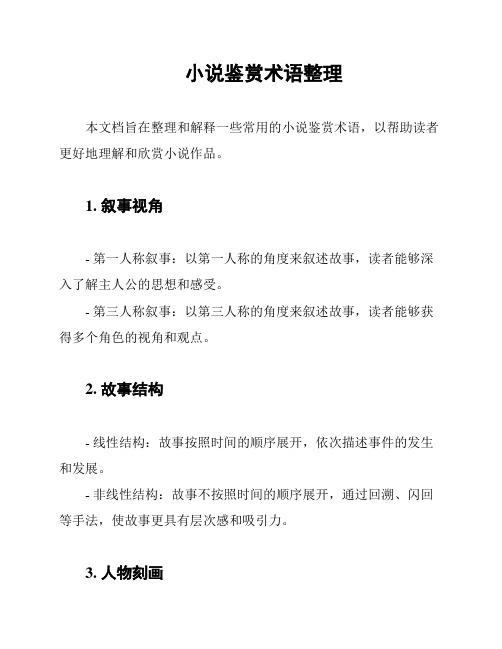
小说鉴赏术语整理
本文档旨在整理和解释一些常用的小说鉴赏术语,以帮助读者更好地理解和欣赏小说作品。
1. 叙事视角
- 第一人称叙事:以第一人称的角度来叙述故事,读者能够深入了解主人公的思想和感受。
- 第三人称叙事:以第三人称的角度来叙述故事,读者能够获得多个角色的视角和观点。
2. 故事结构
- 线性结构:故事按照时间的顺序展开,依次描述事件的发生和发展。
- 非线性结构:故事不按照时间的顺序展开,通过回溯、闪回等手法,使故事更具有层次感和吸引力。
3. 人物刻画
- 主角:故事的核心人物,通常经历重要的冲突和发展。
- 配角:主角的辅助人物,用来推动故事情节和展示主角的性格特点。
- 反派:故事的对立面人物,与主角产生冲突和对抗。
4. 情节发展
- 起始冲突:故事开始时,引发主要冲突的事件或问题。
- 发展:故事的情节逐渐展开,主要冲突得到发展和解决。
- :故事发展到最紧张、最关键的阶段。
- 结局:故事的最终结果和收尾。
5. 文学手法
- 比喻:通过比较和类比,用一个事物来形象地描述另一个事物。
- 暗喻:隐含或间接地进行比较,增加作品的含蓄和深度。
- 悬念:故事情节中留下未解决或未揭示的问题,增加读者的好奇心和吸引力。
希望本文档能对小说鉴赏爱好者提供有用的参考和理解。
如有任何疑问,请随时与我联系。
文学的单词
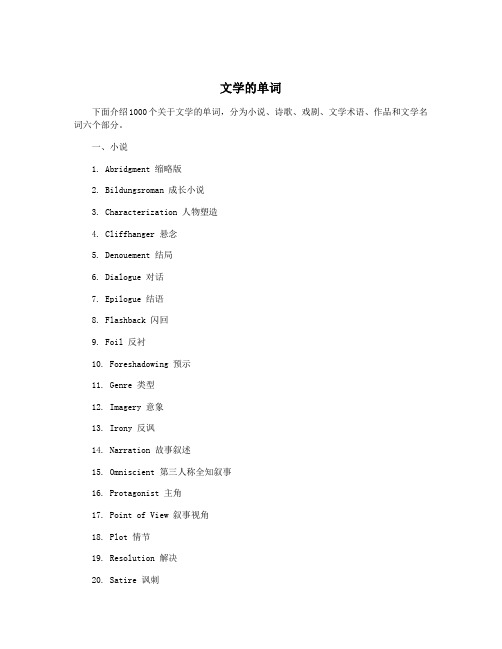
文学的单词
下面介绍1000个关于文学的单词,分为小说、诗歌、戏剧、文学术语、作品和文学名词六个部分。
一、小说
1. Abridgment 缩略版
2. Bildungsroman 成长小说
3. Characterization 人物塑造
4. Cliffhanger 悬念
5. Denouement 结局
6. Dialogue 对话
7. Epilogue 结语
8. Flashback 闪回
9. Foil 反衬
10. Foreshadowing 预示
11. Genre 类型
12. Imagery 意象
13. Irony 反讽
14. Narration 故事叙述
15. Omniscient 第三人称全知叙事
16. Protagonist 主角
17. Point of View 叙事视角
18. Plot 情节
19. Resolution 解决
20. Satire 讽刺
21. Soliloquy 独白
22. Suspense 悬念
23. Symbolism 象征主义
24. Theme 主题
25. Tragedy 悲剧
二、诗歌
三、戏剧
四、文学术语
五、作品
六、文学名词
以上就是1000个关于文学的单词的介绍,希望对学习文学有所帮助。
文学类文本艺术特色的相关术语
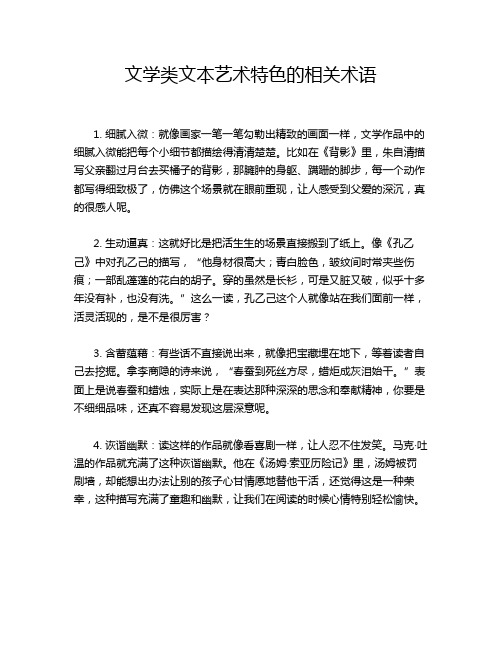
文学类文本艺术特色的相关术语1. 细腻入微:就像画家一笔一笔勾勒出精致的画面一样,文学作品中的细腻入微能把每个小细节都描绘得清清楚楚。
比如在《背影》里,朱自清描写父亲翻过月台去买橘子的背影,那臃肿的身躯、蹒跚的脚步,每一个动作都写得细致极了,仿佛这个场景就在眼前重现,让人感受到父爱的深沉,真的很感人呢。
2. 生动逼真:这就好比是把活生生的场景直接搬到了纸上。
像《孔乙己》中对孔乙己的描写,“他身材很高大;青白脸色,皱纹间时常夹些伤痕;一部乱蓬蓬的花白的胡子。
穿的虽然是长衫,可是又脏又破,似乎十多年没有补,也没有洗。
”这么一读,孔乙己这个人就像站在我们面前一样,活灵活现的,是不是很厉害?3. 含蓄蕴藉:有些话不直接说出来,就像把宝藏埋在地下,等着读者自己去挖掘。
拿李商隐的诗来说,“春蚕到死丝方尽,蜡炬成灰泪始干。
”表面上是说春蚕和蜡烛,实际上是在表达那种深深的思念和奉献精神,你要是不细细品味,还真不容易发现这层深意呢。
4. 诙谐幽默:读这样的作品就像看喜剧一样,让人忍不住发笑。
马克·吐温的作品就充满了这种诙谐幽默。
他在《汤姆·索亚历险记》里,汤姆被罚刷墙,却能想出办法让别的孩子心甘情愿地替他干活,还觉得这是一种荣幸,这种描写充满了童趣和幽默,让我们在阅读的时候心情特别轻松愉快。
5. 雄浑壮阔:就像是站在高山之巅,眺望那无尽的山河,给人一种大气磅礴的感觉。
比如李白的《蜀道难》,“上有六龙回日之高标,下有冲波逆折之回川。
黄鹤之飞尽,猿猱欲度愁攀援。
”那对蜀道险峻的描写,读起来就让人觉得气势恢宏,内心也跟着澎湃起来。
6. 婉约柔美:像江南水乡的女子,温柔细腻。
李清照的词就是这种风格,“莫道不销魂,帘卷西风,人比黄花瘦。
”把那种思念和淡淡的哀愁,用这么婉约的方式表达出来,仿佛能看到一个女子在秋风中独自惆怅的画面,真的很让人心疼。
7. 象征手法:就像是用一个东西来代表另一个更深层次的东西。
- 1、下载文档前请自行甄别文档内容的完整性,平台不提供额外的编辑、内容补充、找答案等附加服务。
- 2、"仅部分预览"的文档,不可在线预览部分如存在完整性等问题,可反馈申请退款(可完整预览的文档不适用该条件!)。
- 3、如文档侵犯您的权益,请联系客服反馈,我们会尽快为您处理(人工客服工作时间:9:00-18:30)。
The Elements of a Story: (文学术语)1.Plot:The plot is the series of events as the author presents and connects them in thetext. The author can narrate these in chronological order from beginning tomiddle to end in which case we say that the story is told in a linear way. But events can also be narrated in a non-linear way, using flashbacks, anticipations and digressions, depending on the effect the writer is trying tocreate in the reader’s mind.2.Narrator:3.CharactersBy characters we mean the fictitious people involved in the narration. In a novel or short story, characters can be presented either directly by the narrator, who may give us details about their physical appearance, social status,personality and so on, or indirectly, through descriptions of their behavior and through their dialogue.4.SettingBy setting we mean the place(s) and time period(s) in which the story takes place. The choice and description of the setting can contribute greatly to thestory’s meaning.5.ThemeBy themes we generally mean the abstract ideas that the story tries to explore. Novels usually have more than one theme and it often happens thatnew themes emerge in subsequent interpretations. The themes discovered in anovel, in fact, reflect the implicit message that the author wished to convey.6.StyleThis refers to many things: the type of language used to tell the story(mater-of-fact, sophisticated, ornate, technical), the rhythm of the sentences, the tone of voice of the narrator (detached, lyrical, ironic etc). All of thesecontribute to both the meaning of the story and to the emotional effect it hason us.7.EffectThe way the story is written plays a large part in the final effect it has on thereader. The writer may wish to surprise the reader, which he can do bykeeping back vital information until the end or by introducing a bizarre turn of events. On the other hand, he may wish to amuse the reader with a playfulor ironic style.Another effect common in many modern short stories isone of leaving readers with a sense of perplexity or anxiety as if the real meaning of the story cannot be found.II.The narrator:The narrator in a novel or short story is the person, or voice, who tells thestory and provides the perspective or point of view from which the story is told. The narrator may be a character in the story, or else may be a voice fromoutside the story, like that of a traditional storyteller or a simple observer.A story is normally narrated in either the first or third person.1. The first-person narrator is a character internal to the story. S/he relates the events that s/he has experienced from his/her point of view. His/her perspective is generally limited.The use of the first-person narrator means that we normally see the story subjectively, that is from the point of view of the person speaking and this may give us the feeling that we are reading something autobiographical. It also means that we generally only get one particular view of the story.When a story is recounted in the first person it is usually the protagonist who speaks, telling his or her own story,and sometimes he or she may only be a secondary character, a witness to events involving other people, or a listener, who listens to somebody else’s story.The narrator as a protagonist:The first-person narrator is typically used to give a definitely fictional protagonist a degree of psychological realism and let the reader into their emotional and psychological inner world.( e.g. David Copperfield)The narrator as witness:The narrator may be a secondary person who witness and recounts a story involving other people. The narrator as a witness is extremely common in the American novel. Owing to the external point of view, witness narrators can see elements of the protagonists,but they fail to see themselves. (e.g. The Great Gatsby)The narrator as a listener:The narrator as a listener is typically someone who tells the reader about an occasion when he heard a story told by someone else. (e.g. Wuthering Heights)2. Third-person narrators remain external to the story. They are principally observes of the events. Third-person narrators may be omniscient and non-omniscient.The omniscient narrator, the most common type of narrator in the English novel, is like a god who sees all (having the knowledge of all things). S/he knows the hearts and minds of all his/her characters better than they know themselves, although s/he may privilege certain characters over others to limit our knowledge, and to influence us in certain ways. We can therefore say that the omniscient narrator can, if s/he chooses, make us familiar with the characters. But s/he can also keep us in the dark. The narrator knows everything whereas we only know what s/he chooses to tell us.A non-omniscient narrator implies that the story is experienced from the point of view of a single character who can only form an impression of the feelings, motives and personalities of the other characters, or that the narrative shifts between different points of view, or that the story is told from a neutral point of view where all the characters are equally opaque. Non-omniscient narrative gives the reader more freedom to form their own ideas and judgments of characters.。
